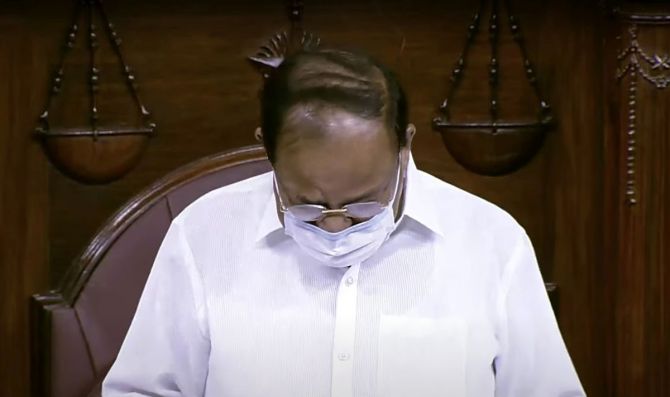Running a fractious House full of members every bit as well versed in parliamentary law as the chair, has, in the past, reduced several Rajya Sabha chairmen to tears.

President Droupadi Murmu is in Rashtrapati Bhavan and it is time for the second big election: Of the Vice President (August 6), almost as important as the President for the single-most important function he performs.
He/she is ex-officio chairman of the Rajya Sabha or the Upper House of Parliament. Which means he/she presides over the House, his/her rulings are law, binding upon all members of the House and become part of parliamentary and Constitutional history.
Which also means that apart from an appreciation of the various problems that members bring to the table (the Rajya Sabha is the House of States, so Members of Parliament flag problems pertaining to their states, as well as national issues), he/she must have thorough knowledge of the states that comprise the nation -- obviously, extensive knowledge of Constitutional law and precedent and eyes at the back of his/her head!
When Sarvepalli Radhakrishnan was inducted as chairman of the Rajya Sabha, in his first speech he wryly recalled Lord Balfour's statement that hell was probably a place where the only reading matter was the file of Hansard (parliamentary proceedings). Those remarks are still part of the Rajya Sabha archives.

It is not an easy job, because there are time bombs lurking in every corner. Running a fractious House full of people every bit as well versed in parliamentary law as the chair, has, in the past, reduced several chairmen to tears.
Outgoing chairman M Venkaiah Naidu could not control himself (2021) as MPs snatched papers from the hands of a minister, broke chairs, and damaged property.
In 1988, the House saw tears rolling down the cheeks of then chairman Shankar Dayal Sharma as Rajiv Gandhi loyalists shouted down his efforts to run the Rajya Sabha in an orderly fashion.
The Congress had a brute majority in the Lok Sabha in those years, but the Opposition was in command of the Upper House, leading to challenging situations.
During his term as chairman, Hamid Ansari actually changed the time for Question Hour (traditionally from 11 am to 12 noon), hoping to take the edge off the enthusiasm of Opposition members eager to disrupt proceedings.
This is the crux of the problem: Parliament is structured in such a way that the ruling party can have a massive majority in the Lower House, but unless it wins almost all subsequent state elections, the Opposition tends to dominate the Upper House. This makes the Rajya Sabha especially fractious -- a tendency that has deepened over time.
Take the tenure outgoing chairman M Venkaiah Naidu. COVID-19 saw the Rajya Sabha's functioning severely truncated. But before the pandemic, frustrated by the Opposition, Naidu set up a two-member committee comprising former Rajya Sabha secretary-general V K Agnihotri and former additional secretary in the ministry of law and justice Dinesh Bhardwaj to study all existing rules and suggest new ones.
The idea was that the current rules needed a review in keeping with the times -- a practice that has been carried out several times in the past via the Rules Review Committee.
The report of the two-member committee proposed 77 amendments to the existing rules and introduction of 124 new rules. There are a total of 303 rules in the existing Rajya Sabha rule book regarding various aspects of functioning of the House. The committee handed over the report to the outgoing chairman.
"We don&'t know what is in the report as it has not been made public," says Chakshu Roy, head of legislative and civic engagement initiatives, PRS Legislative Research. But, he says, there are four broad areas that need to be addressed.
"First, it seems that the two Houses of Parliament meet mostly for transacting government business. The committee will have to balance completion of government business with discussions raised by other political parties.'
'Second, the existing mechanisms (like Question Hour) for securing the government's accountability to Parliament have lost their edge. The committee will have to suggest measures for completely overhauling these mechanisms.'
'Third, issues facing Parliament are now more complex and technical than ever. In such an environment, the committee's suggestions for strengthening deliberations in the House will be crucial.'
'Finally, the disruption of parliamentary proceedings has become a routine affair. The committee will have the difficult task of suggesting solutions for protecting the sanctity of parliamentary proceedings.'
The incoming chairman's task will not just be to conduct the Rajya Sabha in an orderly and democratic fashion. It will also be whether to act on the Agnihotri Committee report or constitute another committee.
S Radhakrishnan said: 'Parliament gives us a sense of proportion. It also gives us a sense of reality.' The new chairman will have to address this challenge.












 © 2025
© 2025